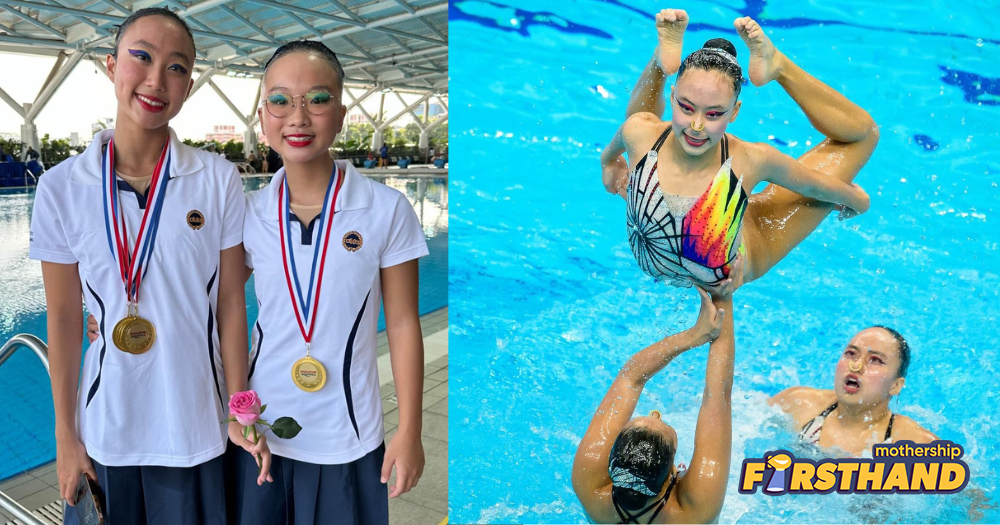“How does she make the time?” I thought to myself as I spoke to national artistic swimmer Yvette Chong.
The 16-year-old is in her last year of secondary school and will be taking the O-Levels in the latter half of the year.
Meanwhile, the national athlete is aiming for a new personal best score for her upcoming Artistic Swimming World Cup in Paris, France in May.
Right now, Chong trains from 5:30am to 7:30am, goes to school until 2:30pm then trains again from 5:30pm to 9:30pm.
Secondary school is a time when teens negotiate the complexities of social circles, and keep up with TV shows and what’s the latest on TikTok.
With training and school work packed to the brim, how does the teen keep going without feeling FOMO?
Started training at a young age
Chong isn’t new to the rigour of balancing school and training. She started training and competing as an artistic swimmer when she was eight.
Before that, she was a gymnast and swimmer, until she found the “best of both worlds” by partaking in her new sport.
In preparation for the interview, I watched a video of China's team competing in the 2020 Tokyo Olympics, showing close-ups of the athletes’ movement above and beneath the water surface.
They were able to hold positions underwater, leap from the water without kicking the floor, lift and toss their teammate, and dance on the surface.
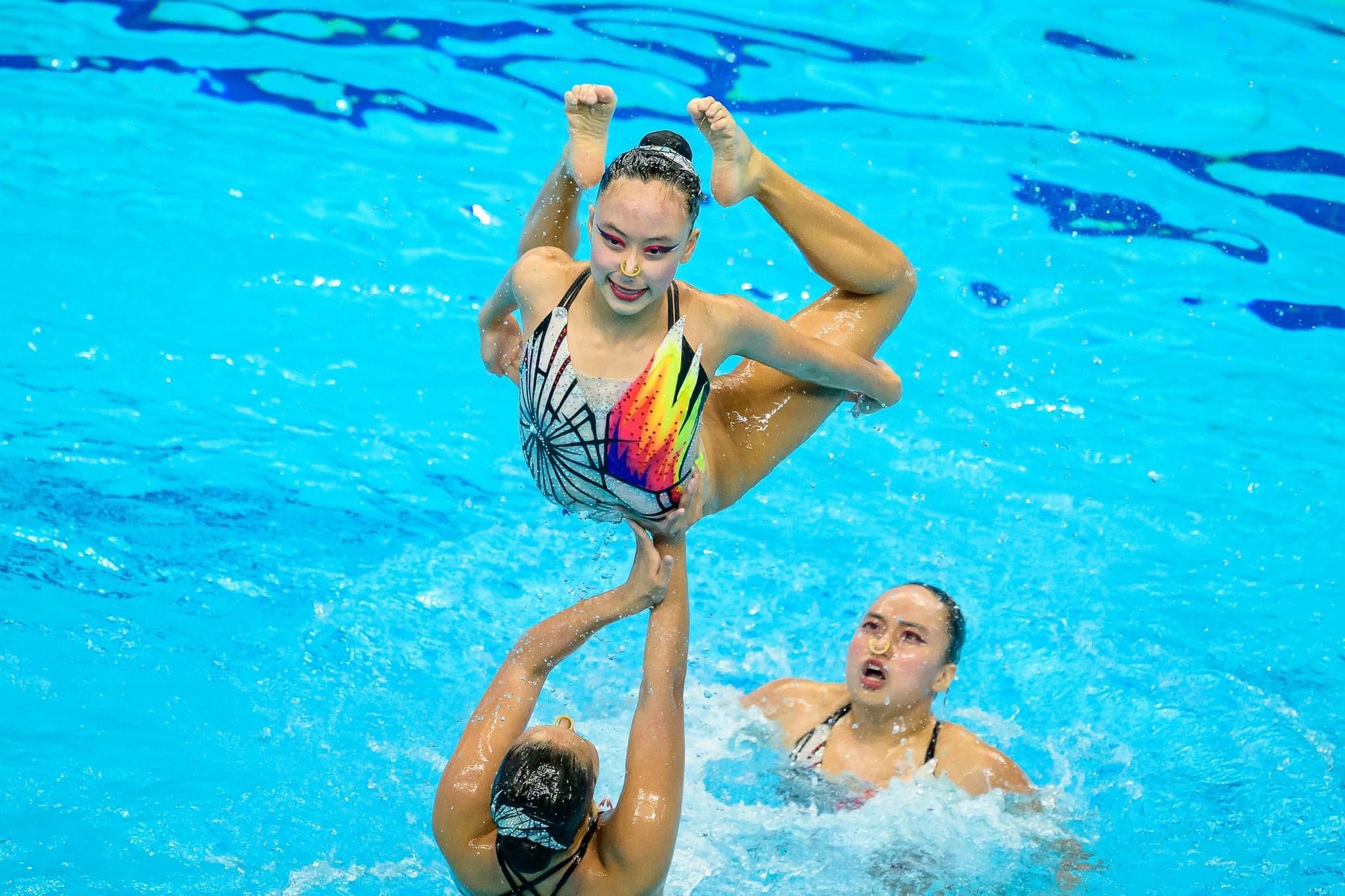 Chong was lifted by her teammates. Image via Yvette Chong.
Chong was lifted by her teammates. Image via Yvette Chong.
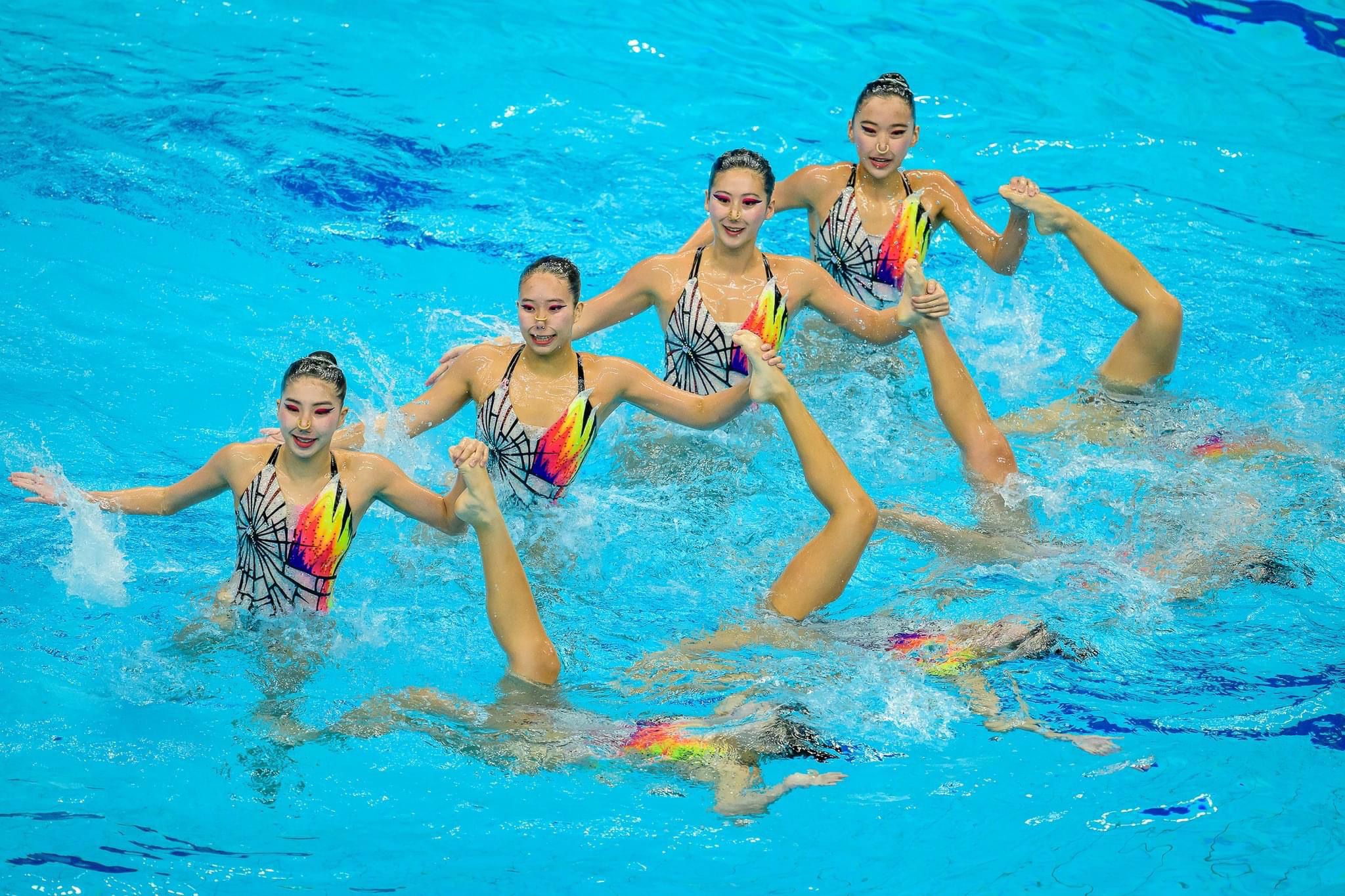 Chong and her team. Image via Yvette Chong.
Chong and her team. Image via Yvette Chong.
“Cheerleading, ballet, gymnastics and swimming all in one,” is how Chong describes the multifaceted sport.
To me, the tricks look humanly impossible. Granted, I’m not a great swimmer and often question my own ability to stay afloat.
But after speaking to Chong, I found out that even she had to relearn how to operate in the water, despite being a swimmer since kindergarten.
Unlike the forward motion of competitive swimming, artistic swimming requires you to move up and down in the water.
To start, she had to learn to just float and scull on water.
Sculling in artistic swimming helps keep swimmers in position, whether on the water's surface or under it.
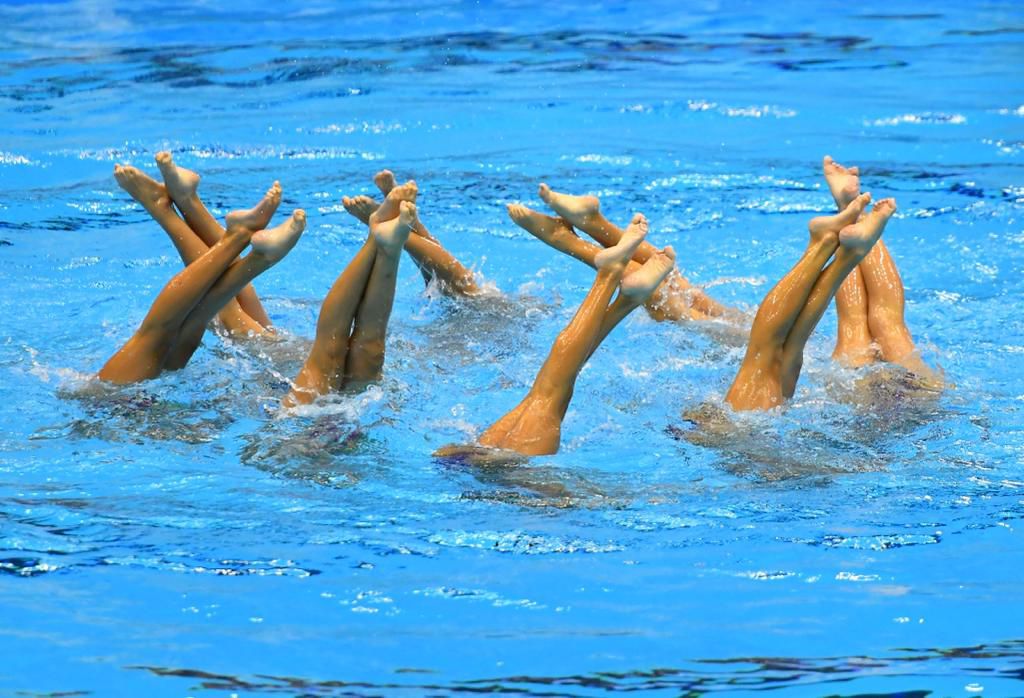 Image via Yvette Chong.
Image via Yvette Chong.
Once she and her teammates got a hang of that movement, the coach taught them how to incorporate “dance moves” like lifting their legs in the air one by one while keeping their backs flat on the surface of the water.
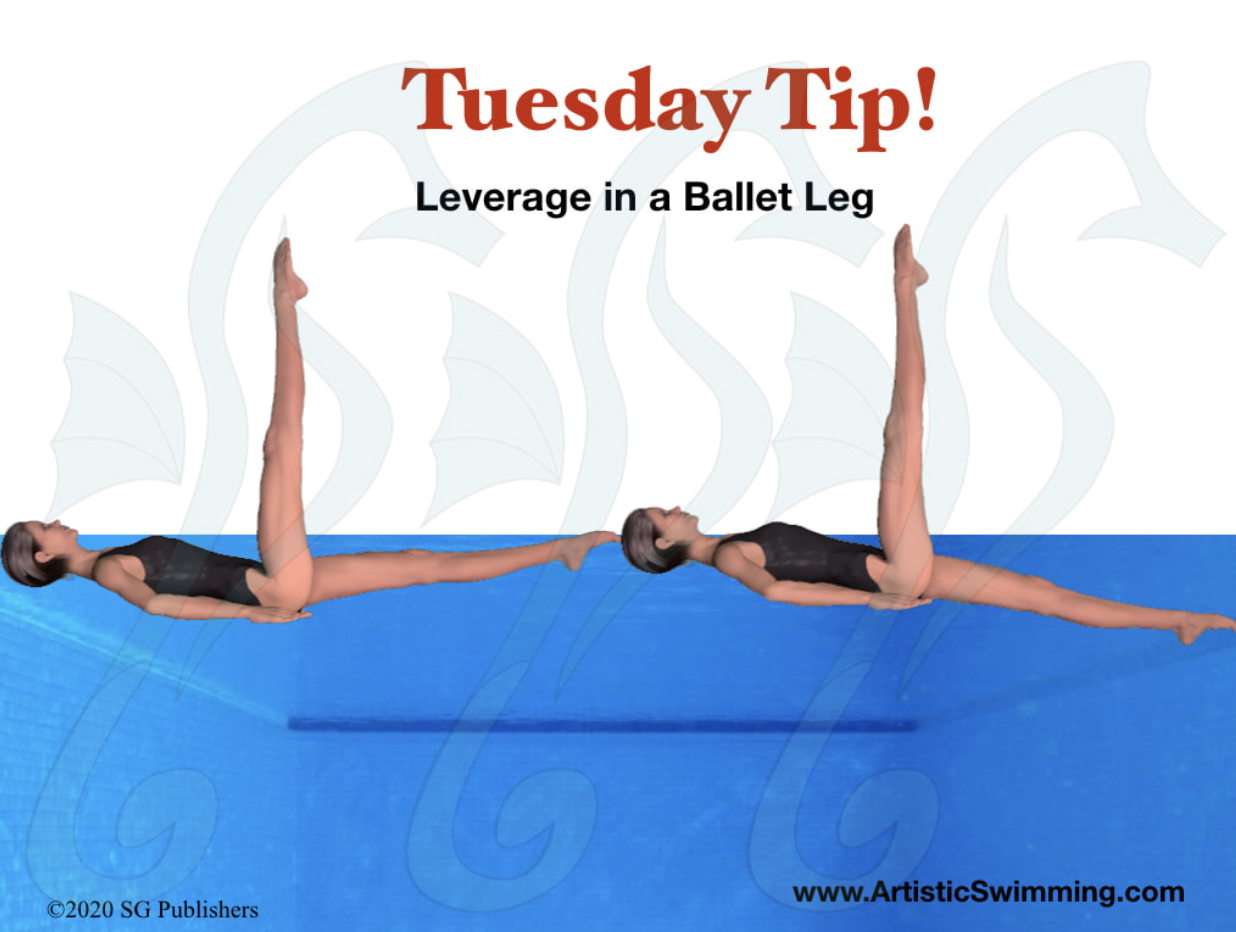 Image via artisticswimming.com
Image via artisticswimming.com
Schedule intensifies
Chong’s schedule has never been a dull one since she started out in artistic swimming.
As a Primary 3 kid, she had 2.5-hour sessions five times a week.
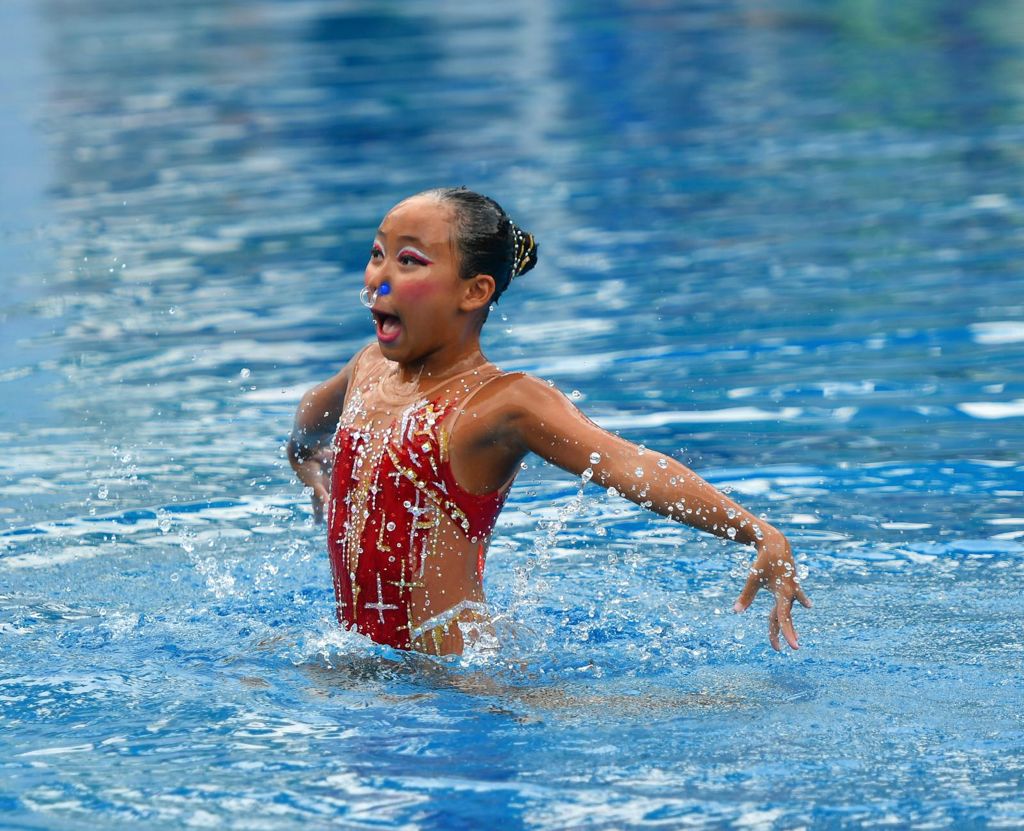 P3 Chong competing. Image via Yvette Chong.
P3 Chong competing. Image via Yvette Chong.
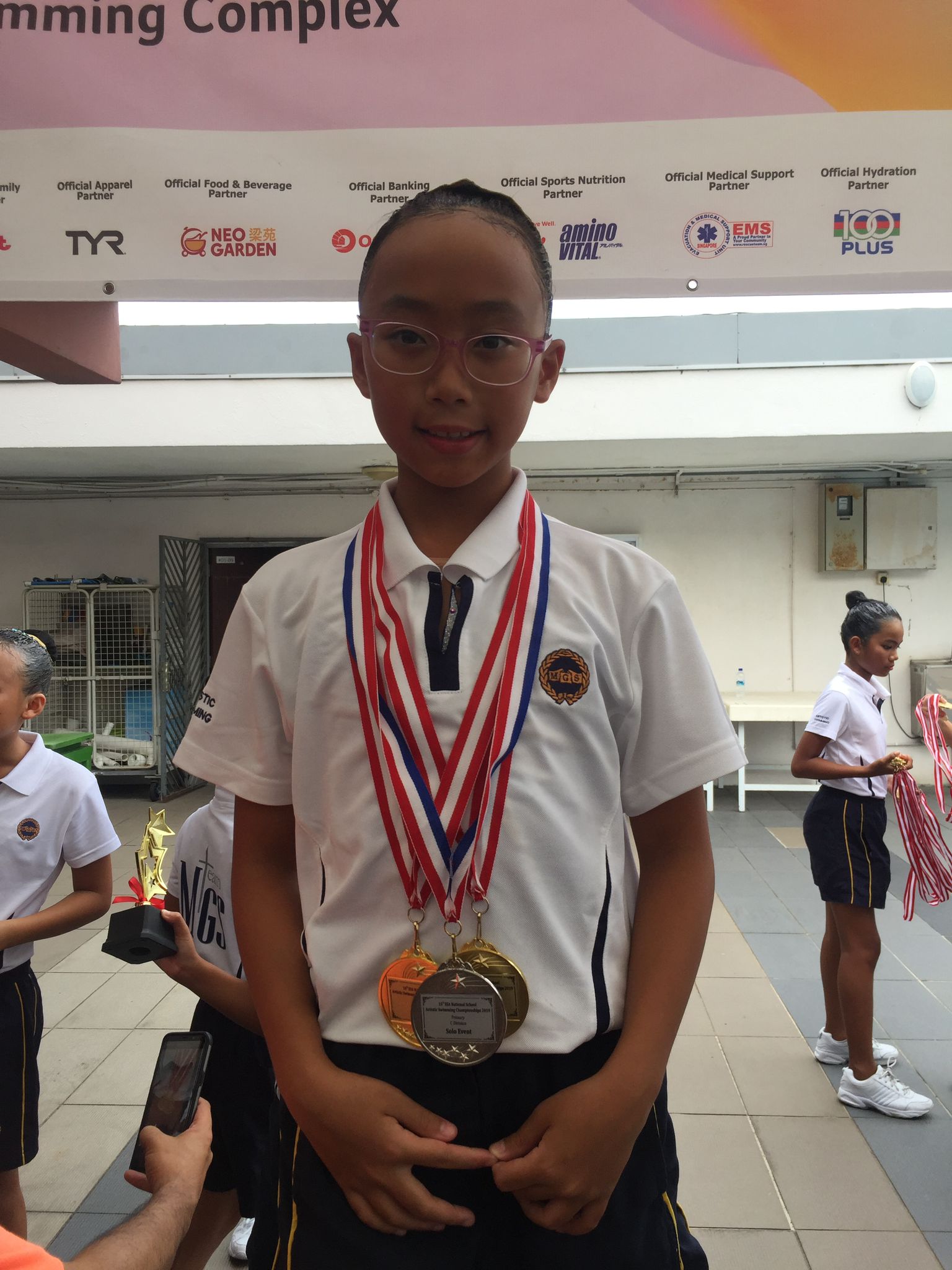 P3 Chong after winning her inter-school games. Image via Yvette Chong.
P3 Chong after winning her inter-school games. Image via Yvette Chong.
By that age, not only did training intensify, but so did the pressure as she was “striving for the podium” — just a year after her debut.
Back then, she was competing in three categories — solo, duet and team — which also meant she had to memorise multiple routines.
The team’s sessions usually started with warm-up laps around the pool, and correcting some techniques before going at their routines over and over again.
Despite the hours, she didn’t mind it.
“I just go with the flow,” she said, not thinking much about it.
It was only when she joined the national team at 15 that she could feel her training draining her.
In the last year, she’s competed in four countries, including at the World Cup in Montpellier, France, the World Championships in Fukuoka, Japan, the Asian Games in Hangzhou, China and the World Championships in Doha, Qatar, which were much bigger events than what she has experienced.
This only meant more hours in the pool with morning and evening training, and seven hours of school in between.
“It's just that when it intensified, I just went with it. It sort of became a normal routine to me,” Chong then said, explaining how she coped with her schedule.
This threw me off a little. Was she not enjoying it anymore?
Balancing school and training
Chong told me that she started practising her duet routine for the World Championship in Doha 2024 which was in February in her morning and evening training sessions during the 2023 December holidays.
“I felt like training was a chore that I had to do everyday. And that’s considering school hadn’t started yet and I was already very tired.”
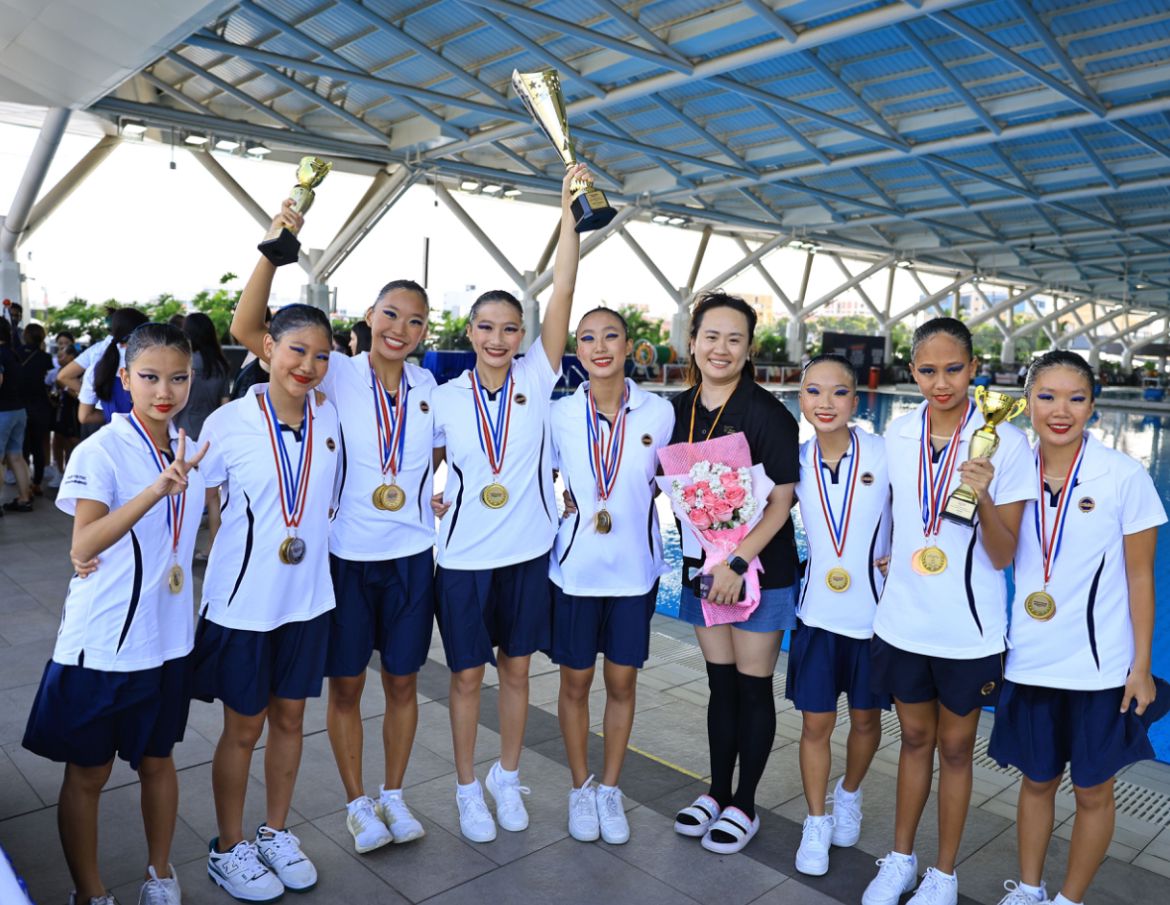 Chong with her school team. Image via Yvette Chong.
Chong with her school team. Image via Yvette Chong.
Once school started, she was dragged from one class to another, knowing that her day would be far from over even after the school day ended.
“I don't think I can move anymore and my brain is not really functioning,” Chong said, describing some of her tougher days.
On top of that, she’s taking her O-Level exams this year.
It’s almost like a battle between coaches and teachers wanting her to do her best in both.
Getting better in artistic swimming means more hours in the pool and better grades mean more homework.
“You have to be organised in a way (you use) your time. When to study, when to stop using your phone and really sit down and focus on what you need to do. And when you’re at training, you need to forget everything about school and focus on training, because the coach will expect your full concentration.”
When I asked if just anyone could be a student-athlete, Chong replied: “I feel like anyone can. It just depends how intense or vigorous trainings are.”
From our conversation, Chong’s training definitely falls in the category of “intense or vigorous”.
Even when I saw her monthly calendar, which she sent over to find a time to meet for this interview, it was hard to find a slot that worked.
How does she balance? By asking for breaks.
Her upcoming challenge is that her Chinese O-Level examination is in May, the same month as the Artistic Swimming World Cup in Paris.
She plans to “compete first”, and when she’s done and home, she already told her coach she needs five days not to train and focus on her studies.
“Once we have competed and everything's done, then I'll prioritise my studies and my coaches are very understanding of that.”
Chong is also one of the 48 athletes in the inaugural cohort of the new spexPotential programme, which seeks to develop promising athletes to achieve sustainable high-performance outcomes.
But still, time is limited for this teen.
Getting the support she needs
“Yes, I do feel that I'm missing out,” Chong said about not having enough time to hang out with her friends.
“My friends always invited me to go out with them, watch them and support them at their National School Games, or whatever activities they're doing. I remember my class actually planned an outing to the beach. But I wasn't able to go because of training.”
But she isn't missing out on the adventures of being a national athlete.
Chong said that she could travel to Australia, Hong Kong, Bangladesh, Fukuoka in Japan, Montpellier in France and more to compete from a young age, which is not an experience many of her peers might have.
“I am very grateful for the teen years… I'm very grateful for (my coaches) and my parents supporting me on this decision.”
And it doesn’t hurt to have supportive friends.
“[My friends] are very understanding and also really supportive. So if you have a competition and you say: ‘Hey do you want to support?’ They’d be like: ‘Yeah, of course’.”
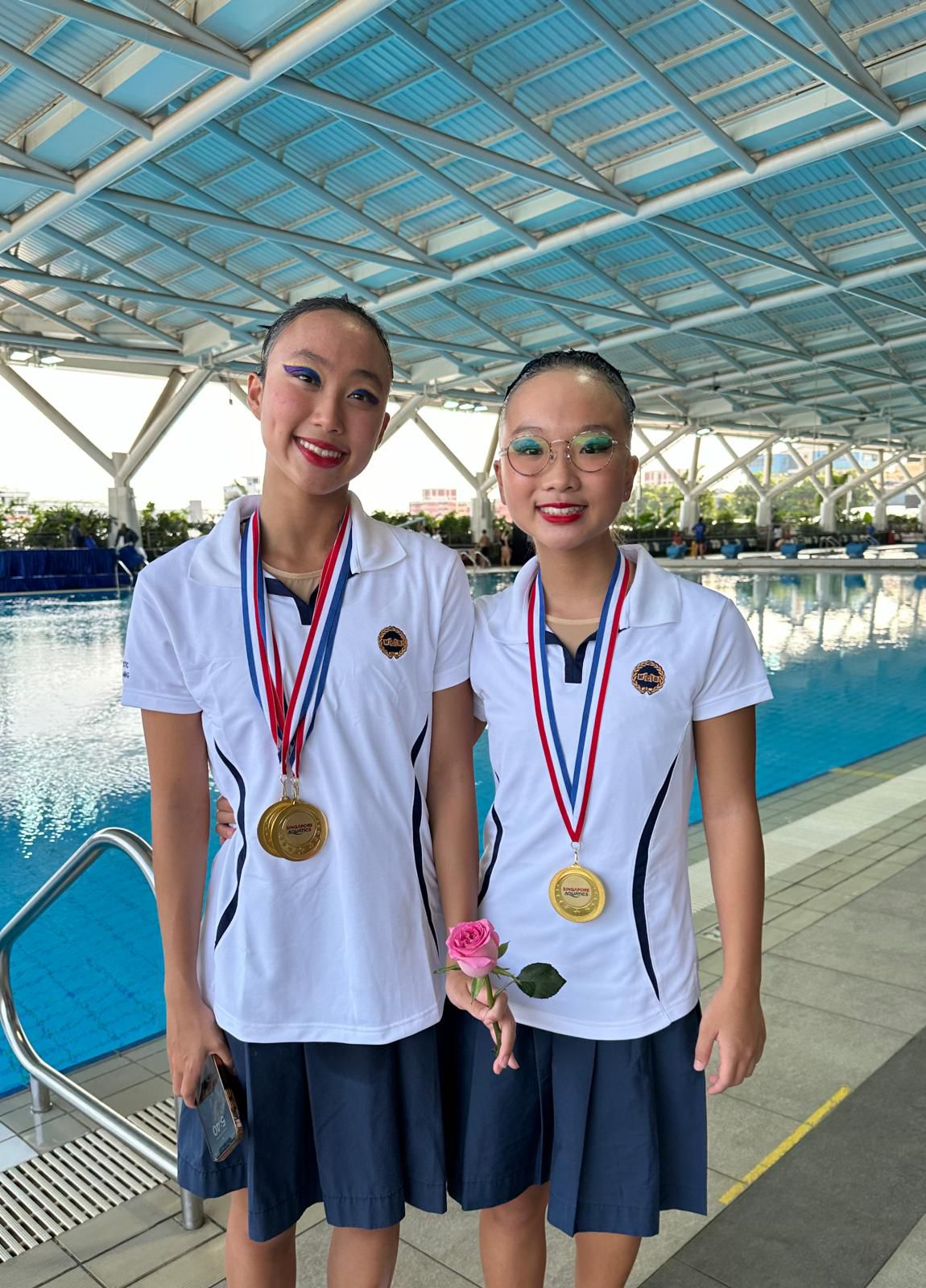 Chong (left). Image via Yvette Chong.
Chong (left). Image via Yvette Chong.
Her friends also know she doesn’t have a lot of free time, so they’ll plan outings around her schedule when they can.
She’s also built strong relationships with her teammates, many of whom are older. So whenever she faces trouble coping with school and training, she always has a group of girls who know exactly what she’s going through.
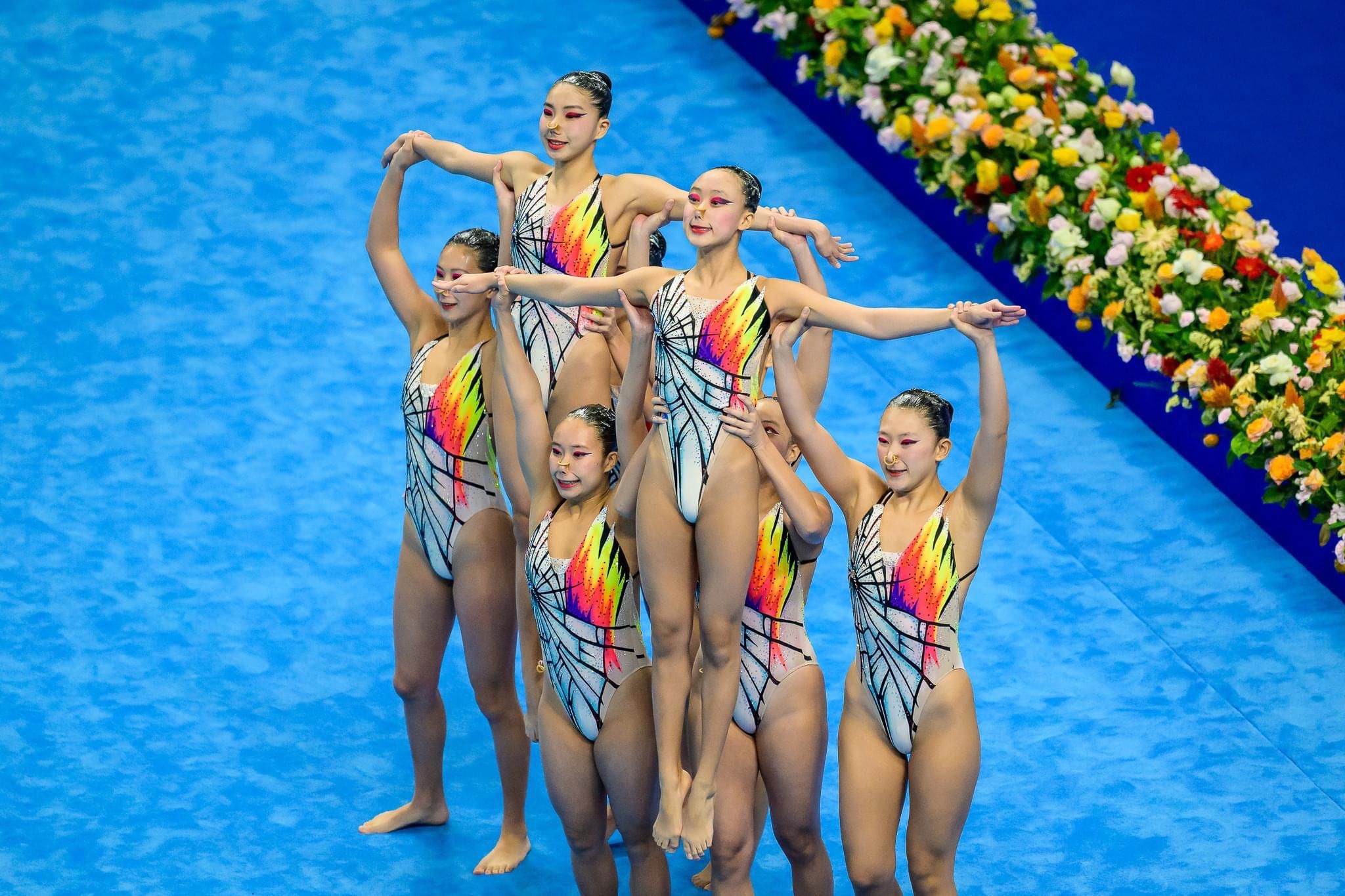 Chong (on the right) is being lifted by her teammates. Image via Yvette Chong.
Chong (on the right) is being lifted by her teammates. Image via Yvette Chong.
Chong has a tough journey ahead. With her upcoming competitions, it seems like her long days will continue.
But instead of whining about not being able to hang with friends or chill in bed, she’s up and ready to go every day – some days more willingly than others.
The 16-year-old is determined to keep at it.
She’s hoping to hit her next personal best score at her next international competition in Paris and knows that the long hours in training are part of what will bring her closer to that goal.
“I wanted to be part of this team and this is the commitment that goes with the contract,” she said.
Top image via Yvette Chong.
If you like what you read, follow us on Facebook, Instagram, Twitter and Telegram to get the latest updates.

